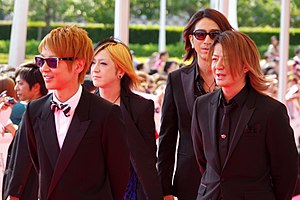Glay
| Glay | |
|---|---|

Glay at the 2014 MTV Video Music Awards Japan
|
|
| Background information | |
| Origin | Hakodate, Hokkaidō, Japan |
| Genres | |
| Years active | 1988–present |
| Labels | Extasy, Platinum, PolyGram, Mustard/Unlimited, Pony Canyon, EMI Music Japan, Capitol, Loversoul Music & Associates/For Life Music |
| Associated acts | Rally, The Predators, Exile, Kyosuke Himuro |
| Website | www |
| Members |
Teru Takuro Hisashi Jiro |
| Past members | Shingo Iso Akira Nobumasa |
Glay is a Japanese rock band, formed in Hakodate in 1988. Glay primarily composes songs in the rock and pop genres, but they have also arranged songs using elements from a wide variety of genres, including punk, electronic, R&B, progressive rock, folk, reggae, gospel, and ska. Originally a visual kei band, the group slowly shifted to less dramatic attire through the years. As of 2008, Glay had sold an estimated 51 million records; 28 million singles and 23 million albums, making them one of the top ten best-selling artists of all time in Japan.
Glay formed in 1988 as a high school band when Takuro asked Teru, a schoolmate, to play the drums. They found a bassist but had difficulty finding a vocalist. When Teru made a tape of his singing and gave it to Takuro he was immediately recruited for the part, leaving the drums part to be filled by another person. On the search for a second guitarist, Hisashi was asked to join but declined the offer, as he was already part of a locally well-known heavy punk/rock band called Ari, which better suited his taste in music. Hisashi eventually accepted Takuro's offer and became Glay's lead guitarist after Ari disbanded.
By the time of Takuro and Teru's graduation, Glay were enjoying some popularity in their hometown of Hakodate and were playing full live houses. Following Hisashi's high school graduation in 1990, the three moved to Tokyo to try to further expand their musical career. The bassist and the drummer chose to stay in Hakodate. In Tokyo, they found a completely different situation: although they had been relatively popular in their hometown, it was not easy to begin a career in Tokyo. Their concerts attracted few people, and sometimes none at all, and many live houses would not accept them because they did not fit well into either rock or pop categories. The band had to conciliate their music career to part-time jobs, and faced financial problems during their first years in Tokyo.
...
Wikipedia
